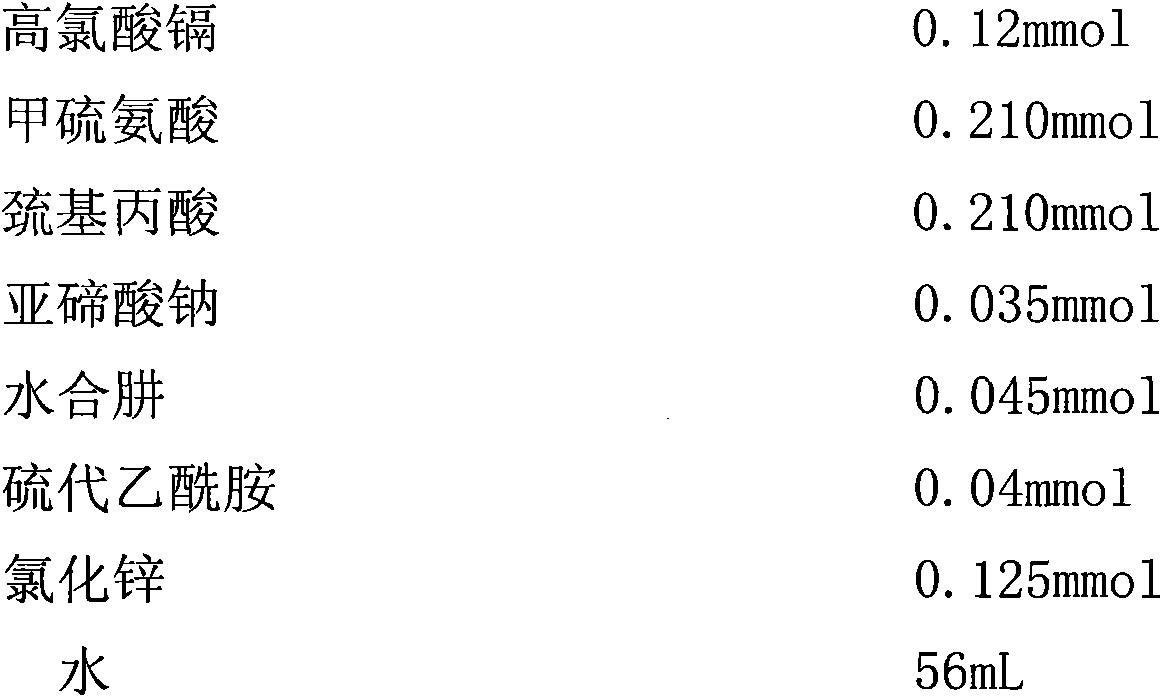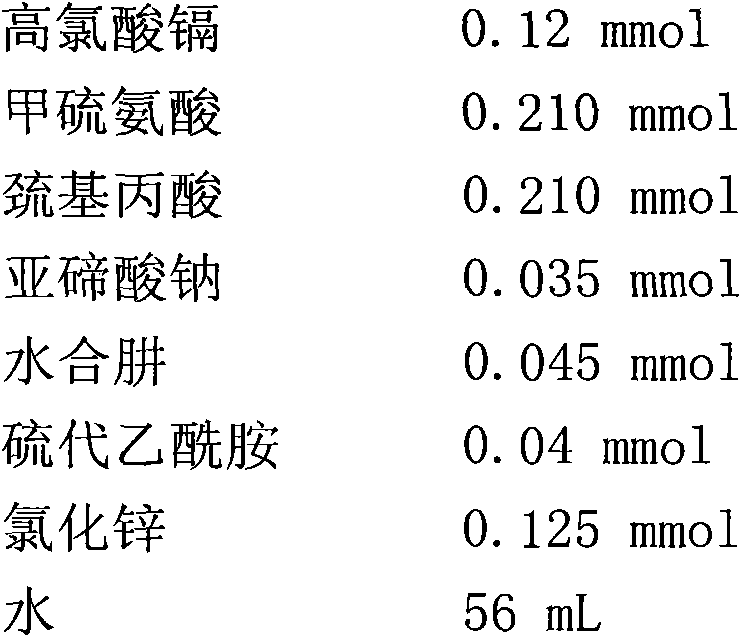Preparation method and application of CdTe/ZnS core-shell quantum dots
A technology of core-shell quantum dots and quantum dots, which is applied in the field of analytical chemistry and nanotechnology, can solve the problems of no public disclosure of quantum dots to detect nitroaromatic compounds, technical characteristics of quantum dot nanomaterials, etc., and achieve structural Stability, good fluorescence stability, and the effect of increasing the reaction rate
- Summary
- Abstract
- Description
- Claims
- Application Information
AI Technical Summary
Problems solved by technology
Method used
Image
Examples
Embodiment 1
[0034] Embodiment 1: A kind of CdTe / ZnS core-shell quantum dots, the preparation steps are as follows:
[0035] Dissolve 0.12 mmol of cadmium perchlorate in 50 mL of deionized water, add 0.105 mmol of methionine and 0.105 mmol of mercaptopropionic acid under stirring, adjust the pH of the solution to 8.5-9.0 with triethanolamine, and stir at room temperature for 10 min , adding 0.035mmol of sodium tellurite (Na 2 TeO 3 ), raising the temperature to 85°C, ultrasonication for 10min, adding 0.045mmol of hydrazine hydrate, and ultrasonication for 10min, to obtain a CdTe nuclear quantum dot solution;
[0036] Add 0.105mmol of methionine and 0.105mmol of mercaptopropionic acid to the CdTe nuclear quantum dot solution, and keep warm for 10min; at the same time, add dropwise 4.0mL of 0.01mol / L thioacetamide solution and 0.05mol / L zinc chloride solution 2.5mL, the dropping time is 5min; 85℃ ultrasonication for 15min to prepare CdTe / ZnS core-shell quantum dot solution;
[0037] The p...
Embodiment 2
[0039] Embodiment 2: draw the standard curve that detects trace amount of nitrobenzene, the steps are as follows:
[0040] (1) Dissolve nitrobenzene in water / acetonitrile with a volume ratio of 1:1.5 to obtain 3.2×10 -9 mol / L~2.7×10 -7 mol / L nitrobenzene standard solution; CdTe / ZnS core-shell quantum dots were dissolved in phosphate buffer to prepare a 0.025 mg / mL CdTe / ZnS core-shell quantum dot solution;
[0041] (2) Take 1mL of CdTe / ZnS core-shell quantum dot solution and 20uL of nitrobenzene standard solution in a 10mL colorimetric tube, dilute to 10mL with deionized water, shake it well, let it stand for 5min, and then add an appropriate amount of This solution transfers in the quartz cuvette, uses 395nm as the excitation wavelength, records the functional relationship between the fluorescence emission intensity and the standard solution concentration of nitrobenzene, and draws a standard curve;
[0042] Nitrobenzene has a fluorescence quenching effect on CdTe / ZnS core-s...
Embodiment 3
[0045] Embodiment 3: the detection of sample
[0046] (1) Dissolve nitrobenzene in water / acetonitrile with a volume ratio of 1:1.5 to obtain 3.0×10 -9 mol / L nitrobenzene standard solution; CdTe / ZnS core-shell quantum dots were dissolved in phosphate buffer to prepare a 0.025 mg / mL CdTe / ZnS core-shell quantum dot solution;
[0047] (2) Accurately weigh 5.000g of sample, add 20mL of water / acetonitrile extraction solution with a volume ratio of 1:1, then add 0.10g of disodium ethylenediaminetetraacetate, ultrasonicate for 30min, centrifuge at room temperature, extract the supernatant, and recycle the residue Extract once with the extract, combine the two extracts, filter, rotary evaporate the filtrate to dryness, and dilute to 1.0mL to prepare a sample solution of nitrobenzene;
[0048] (3) Take 1mL CdTe / ZnS core-shell quantum dot solution and blend it with 20uL nitrobenzene sample solution, dilute it to 10mL with deionized water, shake it well, and after standing still for 5min...
PUM
 Login to View More
Login to View More Abstract
Description
Claims
Application Information
 Login to View More
Login to View More - Generate Ideas
- Intellectual Property
- Life Sciences
- Materials
- Tech Scout
- Unparalleled Data Quality
- Higher Quality Content
- 60% Fewer Hallucinations
Browse by: Latest US Patents, China's latest patents, Technical Efficacy Thesaurus, Application Domain, Technology Topic, Popular Technical Reports.
© 2025 PatSnap. All rights reserved.Legal|Privacy policy|Modern Slavery Act Transparency Statement|Sitemap|About US| Contact US: help@patsnap.com



